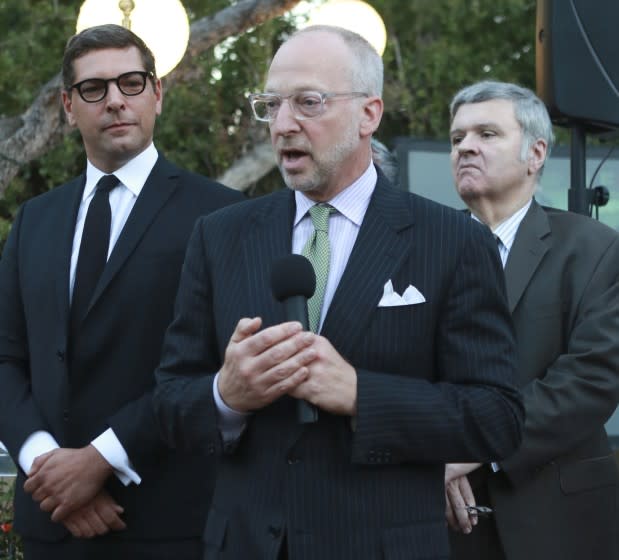Editorial: Did Eric Garcetti fail his #MeToo test?

Nearly three years ago, amid a cultural reckoning that encouraged more people to speak out about sexual harassment and misconduct, particularly in the workplace, Los Angeles Mayor Eric Garcetti committed to reforming the city’s harassment reporting and response protocols.
He mandated that leaders of city departments report any alleged incident of sexual harassment that they hear about to the Equal Employment Opportunity Division in the city's Personnel Department within 48 hours. He called for policies that require supervisors to correct and eliminate harassment in the workplace.
"Every person who works in a city office, in a service yard or a park deserves to feel safe at work," Garcetti said at the time, adding: "When a victim makes the difficult and courageous decision to come forward, the city needs to respond quickly and efficiently.”
But what happened when one of Garcetti’s bodyguards alleged that he was repeatedly sexually harassed by one of the mayor’s top advisors — often in front of Garcetti himself? Those “best-in-classes tools and processes” touted by the mayor appear to have gone by the wayside.
In July, Los Angeles Police Officer Matthew Garza, who worked on the mayor’s security detail, filed a lawsuit against the city alleging that Garcetti’s longtime political advisor, Rick Jacobs, made crude sexual comments and touched him inappropriately during several trips between 2014 and 2019. Jacobs was Garcetti’s deputy mayor until 2016, and afterwards he continued to work and travel with the mayor for political and campaign activities.
The lawsuit claimed sex/gender harassment and the existence of a hostile work environment in violation of the California Fair Employment and Housing Act.
Jacobs has said the lawsuit is “a work of pure fiction.” Garcetti has denied seeing any inappropriate behavior and has publicly stood by his longtime advisor. Tuesday, after journalist Yashar Ali accused Jacobs of sexual misconduct, including forcibly kissing him on the lips, Garcetti released a statement saying he takes “seriously all allegations of harassment.” Jacobs announced that he would “take a leave” from his nonprofit and political work.
With allegations continuing to swirl around Jacobs, this is Garcetti's first major #MeToo test. Did his actions match his rhetoric? Not exactly.
The mayor’s office said Garcetti and his staff learned of Garza’s complaints just before he filed his lawsuit. Rather than refer the matter to the Personnel Department as the city's protocols call for, Garcetti left it to City Atty. Mike Feuer’s office, which hired an outside firm to look into the allegations as part of the city’s legal defense. The mayor’s office said that investigation is the equivalent to any investigation the Personnel Department would have commissioned.
Since the COVID-19 pandemic stopped most travel and in-person meetings, Jacobs has not been in contact with city employees, the mayor's office said.
Garcetti has been an outspoken advocate for #MeToo accountability, yet he didn't publicly treat his bodyguard's allegations with the necessary gravity and concern. That sends a troubling message to city employees — harassment and misconduct complaints will be taken seriously, as long as they don't involve those in power or their allies. As mayor, Garcetti has a responsibility to do better.
This story originally appeared in Los Angeles Times.
